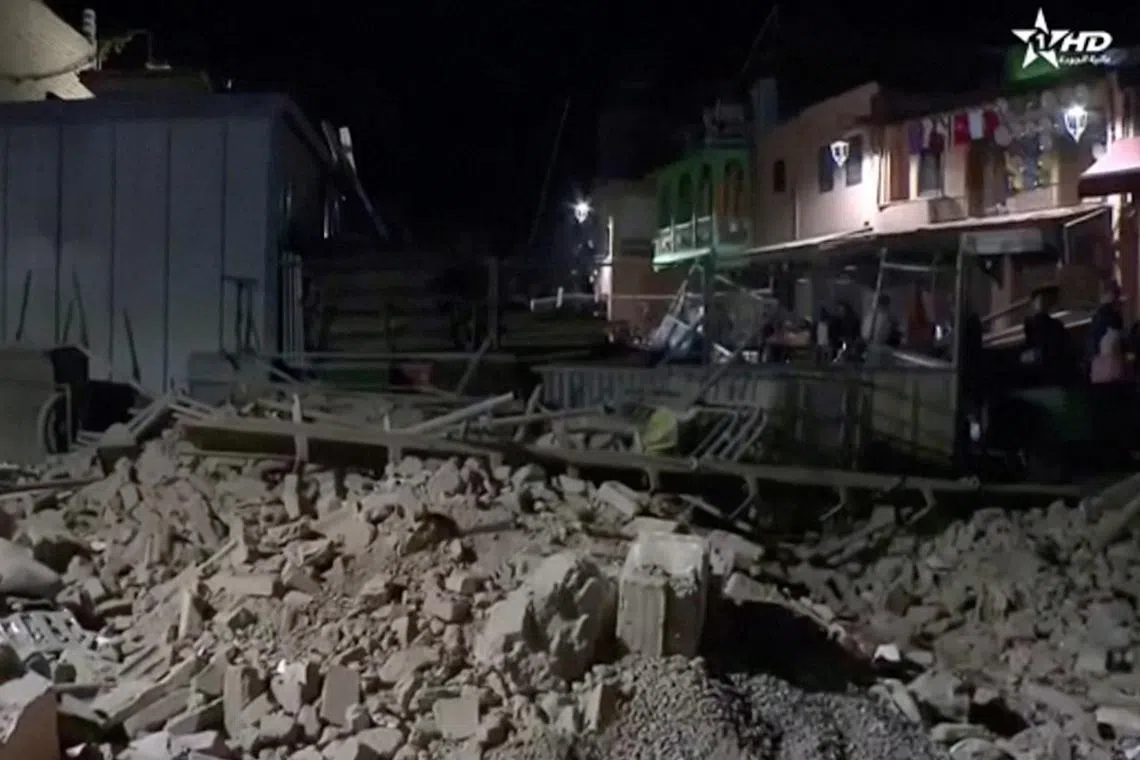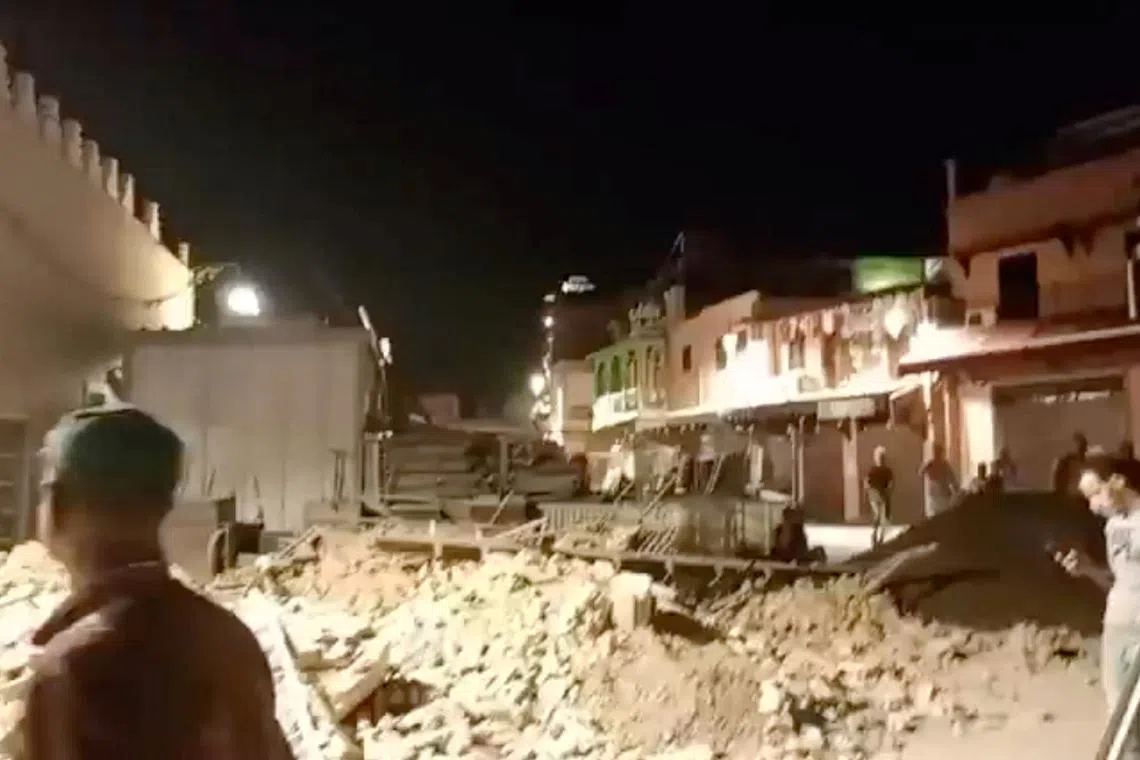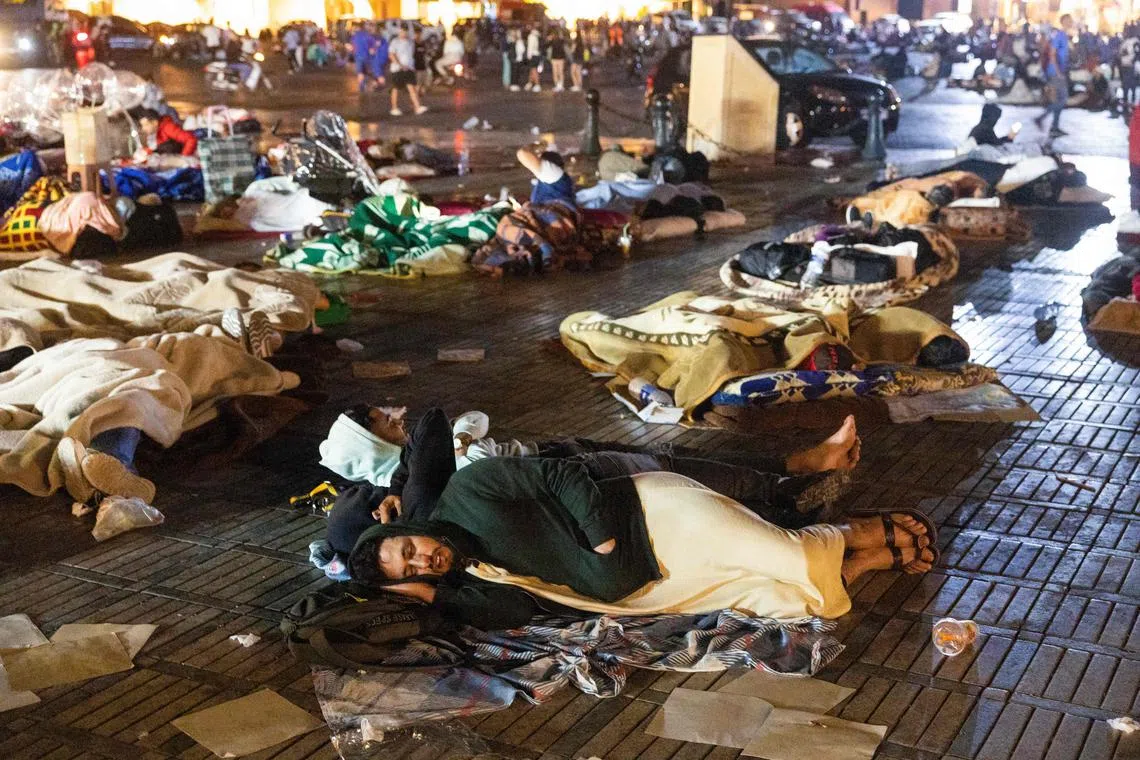Death toll from powerful Morocco earthquake continues to climb
Sign up now: Get ST's newsletters delivered to your inbox
MARRAKECH – The death toll from the powerful earthquake that struck Morocco has risen to over 1,000, state television quoted the Interior Ministry as saying on Saturday.
More than 1,200 people were injured in the magnitude 6.8 quake in Morocco’s High Atlas mountains late on Friday night, it added.
The quake destroyed buildings and sent residents of major cities rushing from their homes.
It was the country’s deadliest tremor since at least 2004. One expert described it as the region’s “biggest in more than 120 years”.
A local official said most deaths were in mountain areas that were hard to reach.
The quake damaged buildings in Marrakech, the nearest big city to the epicentre, where residents spent the night in the open, afraid to go home.
A mosque minaret had fallen in Jemaa el-Fna Square, the heart of Marrakech’s old city, a Unesco World Heritage Site.
“We had to run right after the strong quake,” said Mr Jaouhari Mohamed, a resident of the old city, describing desperate scenes as people fled for safety.
“I still can’t sleep in the house because of the shock, and also because the old town is made up of old houses. If one falls, it will cause others to collapse,” he added.
Local television showed pictures of rubble lying on smashed cars.
The Interior Ministry urged calm, saying in a televised statement that the quake had hit the provinces of Al Haouz, Ouarzazate, Marrakech, Azilal, Chichaoua and Taroudant.
Mr Montasir Itri, a resident of the mountain village of Asni, near the epicentre, said most houses there were damaged.
“Our neighbours are under the rubble, and people are working hard to rescue them using available means in the village,” he said.
Farther west, near Taroudant, teacher Hamid Afkar said he had fled his home, and there had been aftershocks following the initial quake.
“The earth shook for about 20 seconds. Doors opened and shut by themselves as I rushed downstairs from the second floor,” he said.

The magnitude-7.2 quake struck in Morocco’s High Atlas mountains late on Friday night.
PHOTO: REUTERS
Morocco’s geophysical centre said the quake struck just after 11pm local time (6am on Saturday, Singapore time) in the Ighil area of the High Atlas.
The earthquake is Morocco’s deadliest since a 2004 tremor near Al Hoceima in the northern Rif Mountains killed more than 600 people.
Ighil, a mountainous area with small farming villages, is about 70km south-west of Marrakech.
Spanish television RTVE reported that tremors from the earthquake were felt in Huelva and Jaen in Andalusia, southern Spain.
The United Nations stood ready to help the Moroccan government in “its efforts to assist the impacted population”, UN spokesman Stephane Dujarric said in a statement.
Marrakech damage
In Marrakech, some houses in the tightly packed old city had collapsed, and people were removing debris by hand while they waited for heavy equipment, said resident Id Waaziz Hassan.
Footage of the medieval city wall showed big cracks in one section and parts that had fallen, with rubble lying on the street.

Debris lying on the ground in Marrakech, Morocco, on Sept 9, after an earthquake.
PHOTO: REUTERS
Another Marrakech resident, Mr Brahim Himmi, said he saw ambulances coming out of the old town and many building facades damaged. He said people were frightened and were staying outside in case of another quake.
“The chandelier fell from the ceiling and I ran out. I’m still in the road with my children and we’re scared,” said Marrakech resident Houda Hafsi, 43.
Another woman living in the city, Ms Dalila Fahem, said there were cracks in her house and damage to her furniture. “Fortunately, I hadn’t gone to sleep yet,” she said.
Marrakech is due to host the annual meetings of the International Monetary Fund and World Bank in early October.
People in the capital Rabat, about 350km north of Ighil, and in the coastal town of Imsouane, about 180km to its west, also fled their homes, fearing a stronger quake, according to Reuters witnesses.
In Casablanca, some 250km north of Ighil, people who spent the night in the streets were too afraid to return to their homes.
“The house rocked aggressively, everyone was scared,” said resident Mohamed Taqafi. “I thought it was only my house that was moving because it is fragile and old. (But) I heard people screaming, everyone went out of their houses.”
Some videos shared on social media, which Reuters could not immediately verify, appeared to show at least one building collapsing and rubble in the streets.

Marrakech residents resting outdoors at a square following an earthquake in Morocco, on Sept 9, 2023.
PHOTO: AFP
Others showed people running out of a shopping centre, restaurants and apartment buildings and congregating outside.
Governments around the world expressed solidarity and offered assistance.
Indian Prime Minister Narendra Modi, who is hosting the Group of 20 summit this weekend, expressed sympathy on Saturday for the victims of the earthquake.
“Extremely pained by the loss of lives due to an earthquake in Morocco,” he posted on X, formerly known as Twitter. “In this tragic hour, my thoughts are with the people of Morocco. Condolences to those who have lost their loved ones.”
German Chancellor Olaf Scholz, who is attending the summit in India, offered his condolences on Saturday to relatives of the victims of the “devastating” earthquake.
Algeria, which broke off diplomatic relations with Morocco in August 2021 at the height of a crisis between the two countries, offered “its sincere condolences to the brotherly Moroccan people for the victims of the earthquake”, according to the Ministry of Foreign Affairs.
Israeli Prime Minister Benjamin Netanyahu “instructed all government bodies and forces to provide any necessary assistance to the people of Morocco, including the preparations for sending an aid delegation to the area”, his office said. REUTERS


